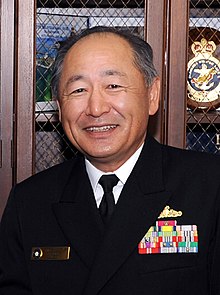|
Katsutoshi Kawano
Katsutoshi Kawano (河野 克俊, Kawano Katsutoshi, born 28 November 1954)[3] is a retired Japanese admiral who served as the 5th Chief of Staff, Joint Staff of the Japan Self-Defense Forces from 2014 to 2019, and was the longest-serving person in that position.[4] Prior to his appointment, he was the Chief of Staff of the Japan Maritime Self-Defense Force, the de facto navy of Japan.[5][6][7] Early life and educationKatsutoshi Kawano was born in Hakodate, Hokkaido on November 28, 1954. He is the son of Imperial Japanese Navy & Japan Maritime Self-Defense Force Rear admiral Katsuji Kawano, and is the fourth child among five siblings. His father was the Commanding Officer of Sub Area Activity Hakodate and participated in World War II as a young officer of the Imperial Japanese Navy and participated in the Pearl Harbor Attacks as a chief engineer for the Japanese submarine I-16. After his father retired as, Kawano and his family moved to Ibaraki City in Osaka Prefecture. Two months before Katsutoshi was born, Katsuji was involved during the rescue and relief operations in the aftermath of the sinking of the JNR train ferry Tōya Maru due to Tōya Maru Typhoon.[2] Kawano entered Kasugaoka High School during his high school years and aspired to be a naval officer under the influence of his father and attended the National Defense Academy of Japan, graduating in 1977 with a degree in mechanical engineering.[2] He then joined the Japan Maritime Self-Defense Force, serving in a number of command and staff positions. In 1990, Kawano also holds a Master of International Studies degree from the University of Tsukuba. Career 
On 26 July 2012, Kawano was promoted to full Admiral and became Chief of Staff of the MSDF, replacing outgoing admiral Masahiko Sugimoto.[10] As MSDF Chief of Staff, he was deeply involved in the ongoing Senkaku Islands dispute.[11] On 14 October 2014, Admiral Kawano was named by then-Prime Minister Shinzo Abe as the Chief of Staff, Joint Staff of the Japan Self Defense Forces (JSDF). As the Chief of Staff, Joint Staff, his term as the is extended thrice, making him serve his post beyond his retirement age at 62. His term was extended first in November 2016, and was extended for a whole year through May 27, due to the North Korea Tensions and for his key strategic insights which gained the support of then-Prime Minister Shinzō Abe.[12] Kawano got his term extended again for the last time until he was replaced by Kōji Yamazaki on March 31, 2019.[13] After retirement, he became an advisor to the Ministry of Defense. Currently, he is a commentator for the Nippon TV group and an advisor for several companies.[14] Awards and honors
Dates of promotion
References
External links
|
|||||||||||||||||||||||||||||||||||||||||
Portal di Ensiklopedia Dunia


